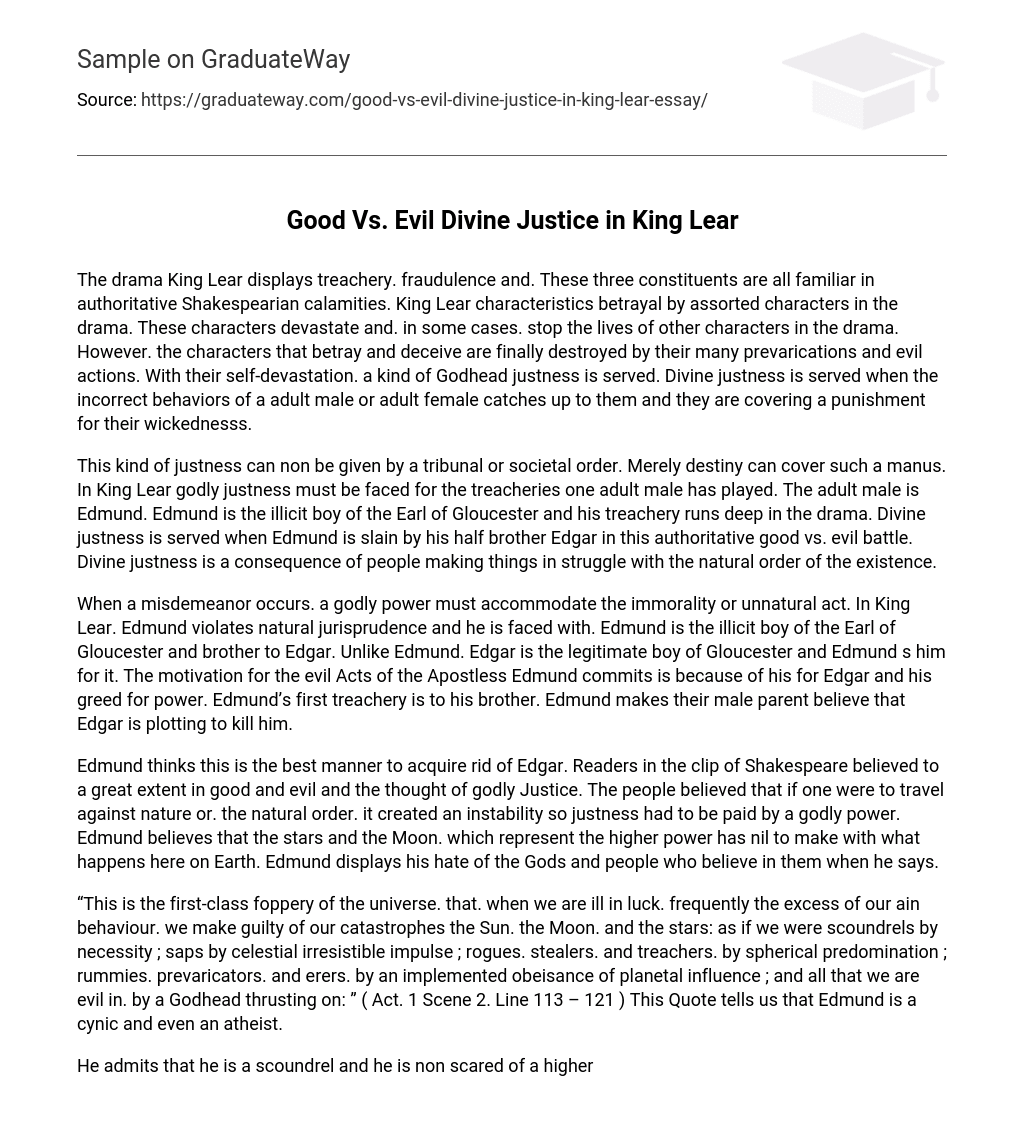The drama King Lear displays treachery. fraudulence and. These three constituents are all familiar in authoritative Shakespearian calamities. King Lear characteristics betrayal by assorted characters in the drama. These characters devastate and. in some cases. stop the lives of other characters in the drama. However. the characters that betray and deceive are finally destroyed by their many prevarications and evil actions. With their self-devastation. a kind of Godhead justness is served. Divine justness is served when the incorrect behaviors of a adult male or adult female catches up to them and they are covering a punishment for their wickednesss.
This kind of justness can non be given by a tribunal or societal order. Merely destiny can cover such a manus. In King Lear godly justness must be faced for the treacheries one adult male has played. The adult male is Edmund. Edmund is the illicit boy of the Earl of Gloucester and his treachery runs deep in the drama. Divine justness is served when Edmund is slain by his half brother Edgar in this authoritative good vs. evil battle. Divine justness is a consequence of people making things in struggle with the natural order of the existence.
When a misdemeanor occurs. a godly power must accommodate the immorality or unnatural act. In King Lear. Edmund violates natural jurisprudence and he is faced with. Edmund is the illicit boy of the Earl of Gloucester and brother to Edgar. Unlike Edmund. Edgar is the legitimate boy of Gloucester and Edmund s him for it. The motivation for the evil Acts of the Apostless Edmund commits is because of his for Edgar and his greed for power. Edmund’s first treachery is to his brother. Edmund makes their male parent believe that Edgar is plotting to kill him.
Edmund thinks this is the best manner to acquire rid of Edgar. Readers in the clip of Shakespeare believed to a great extent in good and evil and the thought of godly Justice. The people believed that if one were to travel against nature or. the natural order. it created an instability so justness had to be paid by a godly power. Edmund believes that the stars and the Moon. which represent the higher power has nil to make with what happens here on Earth. Edmund displays his hate of the Gods and people who believe in them when he says.
“This is the first-class foppery of the universe. that. when we are ill in luck. frequently the excess of our ain behaviour. we make guilty of our catastrophes the Sun. the Moon. and the stars: as if we were scoundrels by necessity ; saps by celestial irresistible impulse ; rogues. stealers. and treachers. by spherical predomination ; rummies. prevaricators. and erers. by an implemented obeisance of planetal influence ; and all that we are evil in. by a Godhead thrusting on: ” ( Act. 1 Scene 2. Line 113 – 121 ) This Quote tells us that Edmund is a cynic and even an atheist.
He admits that he is a scoundrel and he is non scared of a higher power. Because of the clip period in which King Lear was written. and the thoughts of destiny and Godhead powers. it would be probably that a reader of that clip would acknowledge Edmund as a existent evil individual and that the immorality he commits will be punished by the Godhead. It seems that Edmund is doomed from the really beginning because his misdemeanors of natural order by plotting to kill his brother and by his disdain for the Gods. Edmund continues to plot against his brother and Edgar runs off and becomes a Poor Tom. which is an insane mendicant.
Edmund’s 2nd misdemeanor of natural order. which will ensue in penalty. is the treachery of his male parent. The treachery of Glouchester. his male parent. begins with a note from the Gallic that Tells of the invasion of England. Edmund tells the Duke of Cornwall about the missive and the Duke pulls out the eyes of Glouchester because he is a alleged treasonist. These two Acts of the Apostless of evil consequence in Godhead justness. In the drama Godhead justness is seen in the conflict between Edgar and Edmund. A authoritative good vs. evil battle will give Edmund his Godhead justness. Edmund is confronted by the brother he betrayed and is killed.
However. before he is killed Edmund says something to Edgar that tells us that he realizes his destiny and that his incorrect actions have come back to face him when he says ” Thou has spoken right. ‘Tis true. The wheel is come full circle. I am here. “ ( Act. 5. Scene 3. Line 199-200 ) . The “wheel” Edmund refers to is the wheel of luck. All his treacheries have come full circle and it is now clip to be judged. As Edmund dies the reader sees godly justness being served. Although Edmund was slain by the brother he betrayed and. non by a bolt of lightning from above. we still see godly justness being served.
Divine justness does non come in a individual act ; it comes in the class of destiny or fate. It is perfect how the good boy kills the evil boy and England is saved. The perceptual experience is that had Edmund won. England would hold fallen into pandemonium and. when Edgar won. it was like a new England was formed out of the pandemonium of the unnatural immorality Edmund had created. Divine justness is so of import Lear and all narratives because it ensures the victory of good over evil. The conflict is long and ever a battle. but thanks.





